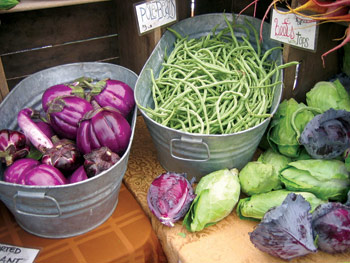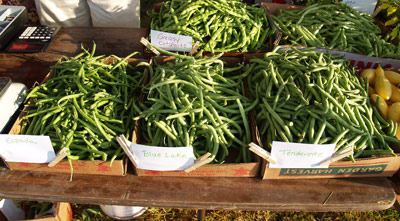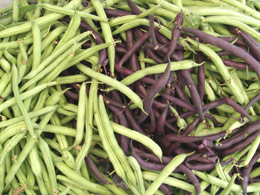Forget the expression, “doesn’t amount to a hill of beans.” In the Southern Appalachians, beans amount to plenty. They’ve been an area mainstay since the first settlers arrived in the region, and there are dozens of varieties of the crop grown here. In fact, it’s even been asserted that more heirloom beans, or traditional cultivars, originated in WNC than anywhere else in the country.

One of the heirlooms distinct to the area is the greasy bean, so called because of its smooth, fuzz-free pod. Anne Grier of Gaining Ground Farm in Leicester says that she enjoys growing many types of beans, but she has a soft spot in her heart for the greasy. She remembers getting her first greasy beans from a fellow local farmer who’d been growing them for decades. “He just handed over a pound of beans for me to start growing,” she recalls.
That literal “passing on” connected her to the heirloom crop’s rich cultural and culinary history; she’s still growing her greasy beans from that original seed, offering the yield in her CSA and at the farmers market.
Grier describes growing beans as a “labor of love.” She grows all of her varieties organically, which makes the plants vulnerable to the destructive Mexican bean beetle. She works tirelessly to stay ahead of the insects, killing those found on her beans by hand.
In addition to the beetles, chef and grower Nate Allen remarks that growers need to keep ahead of the plantings themselves — beans are prolific, he says, and growers should ensure that all beans get eaten in season, or stored to enjoy later.

“It’s hard to contemplate the bleakness of winter in this heat, but it’s coming on sneaky feet, and we must be prepared so we can have delicious green things in our winter stews,” says Allen.
Allen grows and sources local beans for his Spruce Pine restaurant, Knife & Fork, because they’re just that delicious. When it comes to a farm-fresh bean, versus one trucked in for miles, “there’s all the difference in the world,” he declares. “Just snap one out of your garden, pop it in your mouth and compare it to one from the produce aisle — no contest.”
He enjoys fresh beans, tempura-battered, fried and served with a spicy aioli dip. He also likes to sauté them with shiitake mushrooms, adding salt and pepper, thyme and a splash of lemon juice.
While they lend themselves perfectly to fanciful preparations, fresh beans also taste great prepared in a more straightforward manner. Grier likes a simple steaming or boiling with any type of herb. She sometimes finishes the beans off with a little butter. Tender, stringless bean varieties only require a quick sauté or steam. More mature beans, like the greasy, require a longer cooking period.
If you have a young one afraid of anything green on their plate, try the purple Royal Burgundy variety, now available at local farmers markets. While their color doesn’t remain as bold when cooked, the changing shade is a magic trick sure to impress any child into at least a taste.
You’ll find beans on Knife & Fork’s menu this month, as well as the menus of other local restaurants, as part of Get Local, a program of Appalachian Sustainable Agriculture Project (www.asapconnections.org) that brings together restaurants around the region to highlight a single seasonal ingredient in their own unique dishes. Check out Nate’s bean-and-bacon recipe below.
Maggie Cramer is the Communications Coordinator at Appalachian Sustainable Agriculture Project (www.asapconnections.org). Contact her at maggie@asapconnections.org.



We grow Moodys Greasys in Haywood County NC and sell them at the WNC Farmers Market. They always sell and everybody looks for the greasy beans when visiting the market for a great canning bean for winter!